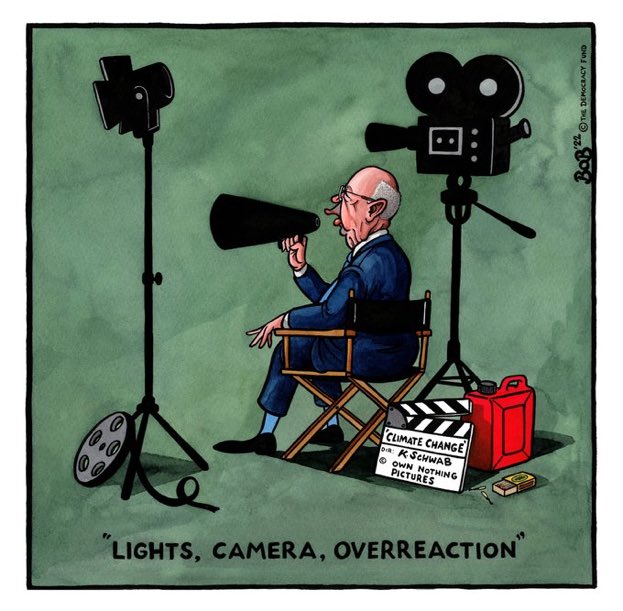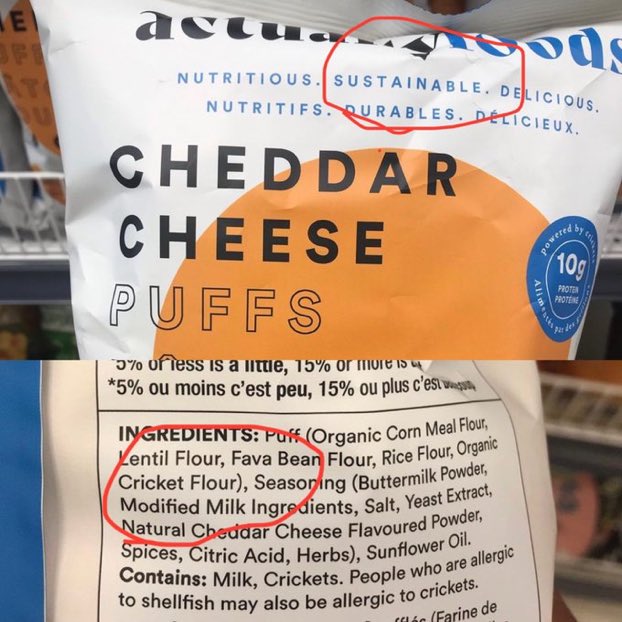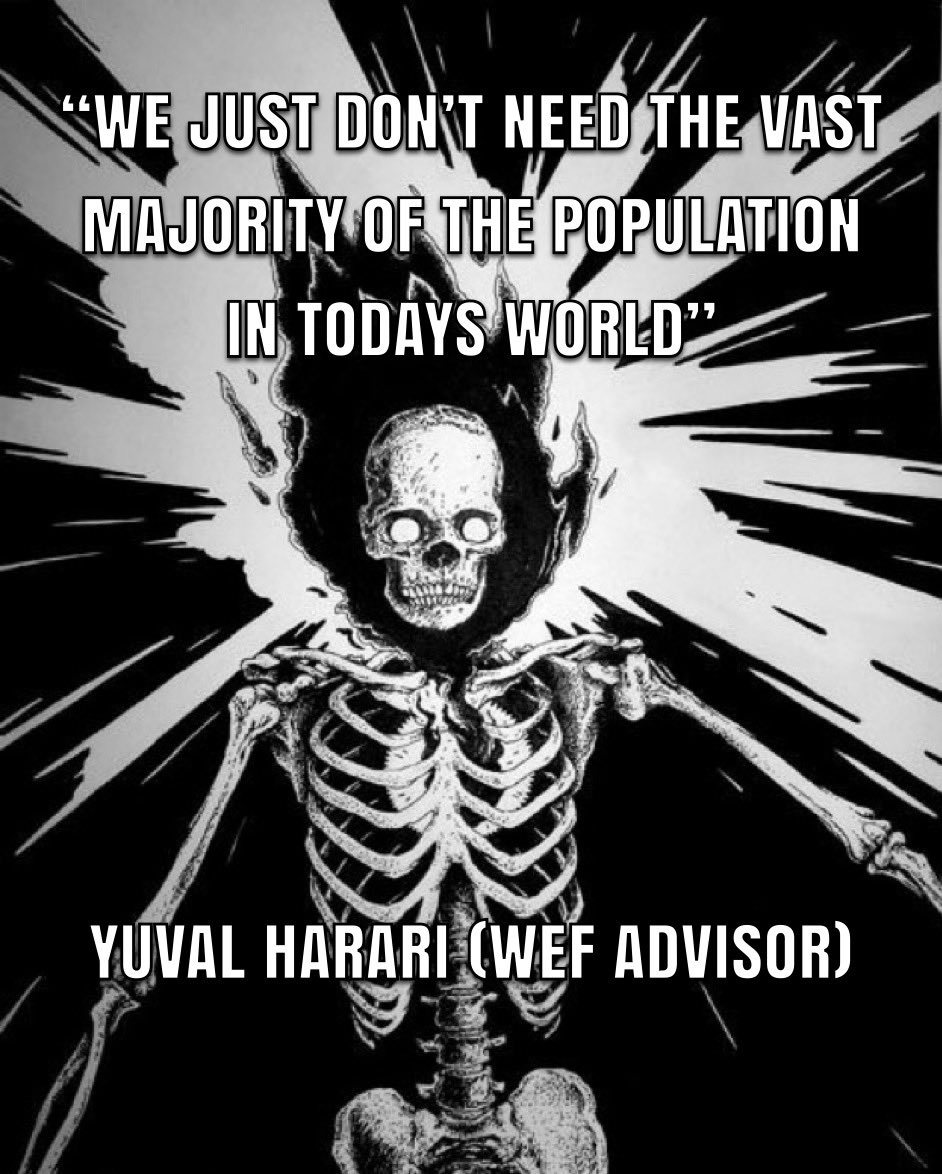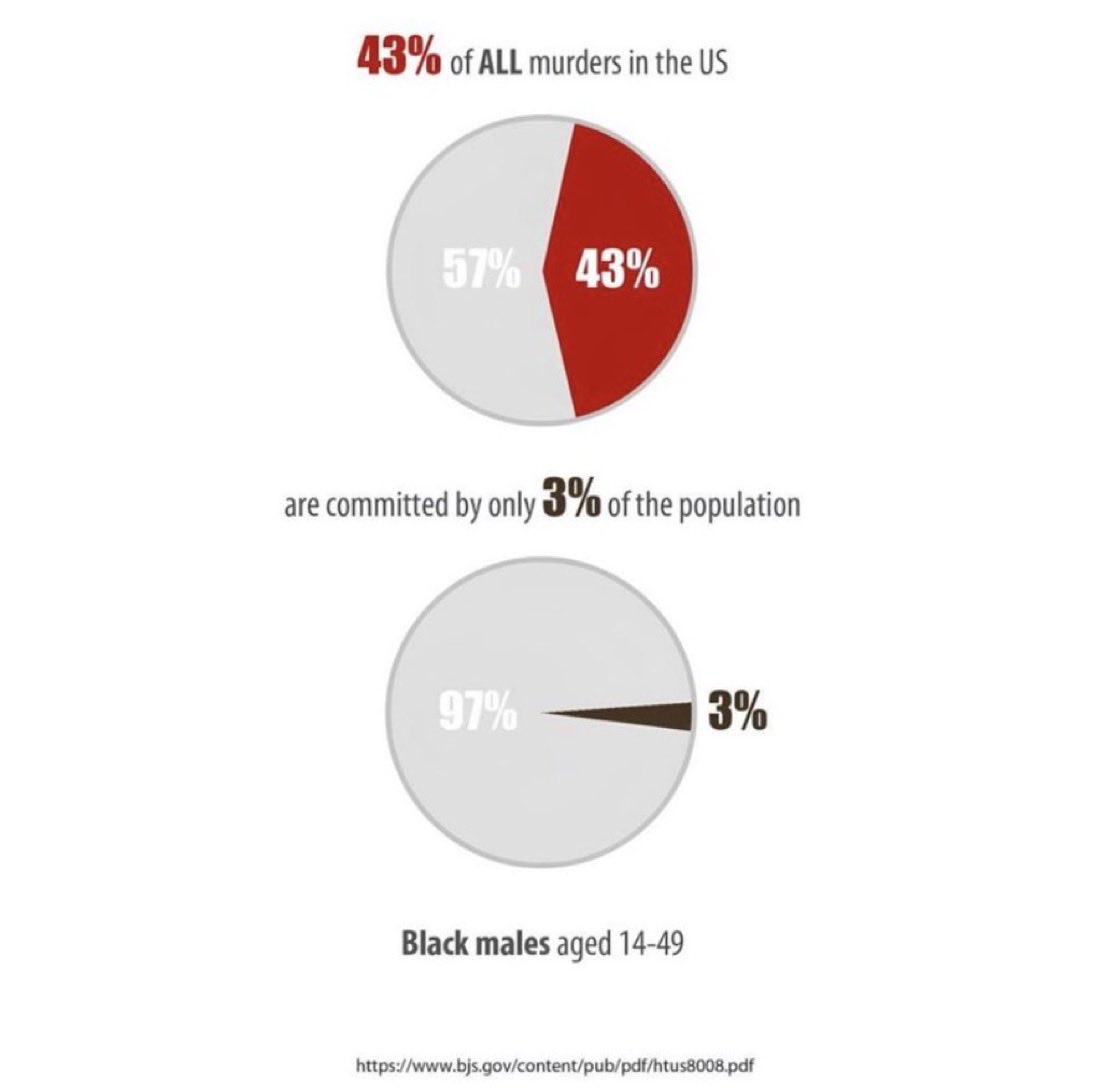WEF (World Economic Forum), WHO (World Health Organization), IMF (International Monetary Fund) and a whole bunch of non democratic, unelected organizations try to control the narratives of this free world.
We can’t follow them blindly, a thread 🧵👇
We can’t follow them blindly, a thread 🧵👇
@wef Klaus and the Davos crowd are scared that they'll lose control of their #GreatReset narrative if #Bitcoin succeeds as a worlds top currency 

Resist the #GreatReset 

Justin Trudeau is a WEF operative working for the #GreatReset 

WEF with its #GreatReset agenda influencing nations for the same 

Are people realizing the consequences of #GreatReset and WEF tactics 

#GreatReset and WEF lost a puppet Boris Johnson, who’s next Klaus 🤷♂️ 

Reject & resist everything these WEF schmucks propose like #GreatReset 

Resist #GreatReset 

Reject & resist the #GreatReset 

#GreatReset by Klaus & his puppets 

Reject #GreatReset & Team Klaus 

Klaus the #GreatReset puppeteer 

WEF the #GreatReset puppeteers 

Reject WEF & #GreatReset 

WEF & Team Klaus #GreatReset 

WEF Klaus #GreatReset 

WEF & #GreatReset 







This is the world they’re planning for us to live in… are you all gonna let that happen silently or resist & protest 

When it succeeds, you take credit
When it fails, just delete it… right?
When it fails, just delete it… right?
https://twitter.com/JackPosobiec/status/1546713624982454272
They wanna control what you do
They wanna control what you eat
They wanna control what you own
They wanna control what you drink
They wanna control what you think
They wanna control what you eat
They wanna control what you own
They wanna control what you drink
They wanna control what you think

Ze future will be built by us
Zou will be controlled by us
Zour bodies will be controlled by us
Zour media will be controlled by us
Zour food will be controlled by us
Zour minds are under our control
Zour ownership is under our control
Zwe own you 👉
Zou will be controlled by us
Zour bodies will be controlled by us
Zour media will be controlled by us
Zour food will be controlled by us
Zour minds are under our control
Zour ownership is under our control
Zwe own you 👉
Yeah right… like China 🇨🇳 gives a damn about Klaus & his west goons 😂
https://twitter.com/disclosetv/status/1549475445309046795
WEF thinks if Earth had 10% of its population equivalent to what was 500 years ago, we’d have no problems.
I’d suggest start with culling WEF team from Klaus & his puppets
I’d suggest start with culling WEF team from Klaus & his puppets
https://twitter.com/ALilyBit/status/1549127159238852608/video/1
WEF penetrates your country cabinets
https://twitter.com/JamesMelville/status/1550083219667697667
The way media works is exposed
The way narratives work is exposed
The way they milk issues is exposed
- COVID pandemic
- Ukraine war
- Climate crisis
The way narratives work is exposed
The way they milk issues is exposed
- COVID pandemic
- Ukraine war
- Climate crisis
This guy is hellbent on running the 🌍
Justin Trudeau investing over $100 million into a WEF program called KTDI - Known Traveler Digital Identity
A social credit system for the west 🤷♂️
A social credit system for the west 🤷♂️
WEF is developing an individual carbon footprint tracker. Sounds awesome right. How about hiding all those trackers for the top 0.01% elite and opening up trackers for the masses.
It’s all about controlling the masses by centralizing more power 🤷♂️
It’s all about controlling the masses by centralizing more power 🤷♂️
Build Back Better is in other words to gain more power for them, leave you more powerless & defenseless against them. Centralizing more power.
#buildbackbetter is a scam
#GreatReset is a fcuking scam
#Agenda2030 is a fcuking scam
Opt out of their lies
#buildbackbetter is a scam
#GreatReset is a fcuking scam
#Agenda2030 is a fcuking scam
Opt out of their lies
If WEF says you’ll be happy, you won’t
If WHO says it’s deadly, it isn’t
If big Pharma says it works, it doesn’t
If media states something, it’s false
If politicians promise you, they lie
If WHO says it’s deadly, it isn’t
If big Pharma says it works, it doesn’t
If media states something, it’s false
If politicians promise you, they lie

They’ll own private jets, but you need to cut down on your travel & gas
They’ll own the robotaxi fleet, while you stop buying cars & get rides from those robotaxis
They’ll own the animal farms, animal meats while you get to eat bugs
They’ll own the robotaxi fleet, while you stop buying cars & get rides from those robotaxis
They’ll own the animal farms, animal meats while you get to eat bugs

Do WEF global technocrats have god complex… if god created organic entities, they’ll create inorganic entities like robots & cyborgs
#GodComplex
#GreatReset
#WEFpuppets
#Agenda2030
#GodComplex
#GreatReset
#WEFpuppets
#Agenda2030
People who are allergic to shellfish are also allergic to crickets 🦗
We are going to open a huge can of worms with potentially new allergies
We are going to open a huge can of worms with potentially new allergies

WEF wants y’all poor & helpless
- don’t drive
- don’t eat meat
- don’t own vehicles
- keep injecting their vaccines
- automate jobs to cyborgs
- control your thought processes
- health signal pills into your bodies
They want you to be their puppet 🤷♂️
- don’t drive
- don’t eat meat
- don’t own vehicles
- keep injecting their vaccines
- automate jobs to cyborgs
- control your thought processes
- health signal pills into your bodies
They want you to be their puppet 🤷♂️

Humans as a collective network can form #InternetOfBodies
Collectively they can monitor & control
- what we eat
- what we drink
- what we think
- what diseases we’re susceptible to
- what medicines we take
- what our DNA profiles are
Collectively they can monitor & control
- what we eat
- what we drink
- what we think
- what diseases we’re susceptible to
- what medicines we take
- what our DNA profiles are
A dire warning to WEF — Klaus Schwab & his goons
In May 2022 a 43 car potash (fertilizer ingredient) carrying train was derailed in Canada which you might have never heard of…
Was this some WEF conspiracy 🤷♂️
Was this some WEF conspiracy 🤷♂️
https://twitter.com/Amaralee23/status/1551726895544160256/video/1
Avoid the #GreatReset like a plague
Avoid the WEF Klaus & his goons like a plague. Say no to the globalist agenda.
Avoid the WEF Klaus & his goons like a plague. Say no to the globalist agenda.

It’s happening folks… y’all will be eating bugs shortly, they’re programming your minds as we speak
They push humans to start consuming insect milk, insect protein and soon god knows what’s gonna be our fate 

China is by far the biggest environmental polluter in the world and it doesn’t give a shit about WEF policies, ESG concerns, pollution levels… yet farmers in Netherlands suffer from WEF pollution controls.
WEF is a joke, ESG is a joke
UN climate initiative is a joke
WEF is a joke, ESG is a joke
UN climate initiative is a joke

This is getting ridiculously out of hand.
They want you to stop eating meat, start eating bugs, start drinking cockroach 🪳 milk, stop farting WTF
They want you to stop eating meat, start eating bugs, start drinking cockroach 🪳 milk, stop farting WTF

They want you to rent clothes instead of buying clothes and be happy…
They can instantly identify you based on the digital ids sewn into clothes…
thecountersignal.com/the-wef-wants-…
They can instantly identify you based on the digital ids sewn into clothes…
thecountersignal.com/the-wef-wants-…
WEF 2030 targets per person
- 0 kg meat consumption
- 0 kg dairy consumption
- 2500 calories per day
- 3 new clothes per year
- 0 private vehicles
- 1 short haul return flight in 3 years
They control food, travel, entertainment while you lick your wounds & suck your thumbs 🤷♂️



- 0 kg meat consumption
- 0 kg dairy consumption
- 2500 calories per day
- 3 new clothes per year
- 0 private vehicles
- 1 short haul return flight in 3 years
They control food, travel, entertainment while you lick your wounds & suck your thumbs 🤷♂️




Historically taking a loan from the IMF has been with the touch of evil
It always comes with strings attached, always ends up really bad for the country’s economy, people and the overall country’s future in general
Stop taking loans from IMF… for you end up selling your soul
It always comes with strings attached, always ends up really bad for the country’s economy, people and the overall country’s future in general
Stop taking loans from IMF… for you end up selling your soul

8 key predictions from WEF for 2030
Eat ze bugs proteins & be happy
Eat synthetic meats & be happy
Eat synthetic meats & be happy
Personal carbon wallets are coming
Are you ready to trade those personal carbon credits to rich people so they don’t give a shit about the planet while you wither away in a dark hole 🤷♂️
Are you ready to trade those personal carbon credits to rich people so they don’t give a shit about the planet while you wither away in a dark hole 🤷♂️
WEF optimizing your food supply chains… what could go wrong when you smell for freshness and eat, what happens when 100s of people start smelling the produce 🤷♂️
Hey WEF — do you even know what a Ponzi scheme is or do you not care because you yourself are a Ponzi scheme
https://twitter.com/DylanLeClair_/status/1555271110278651904
Fcuk the #GreatReset 
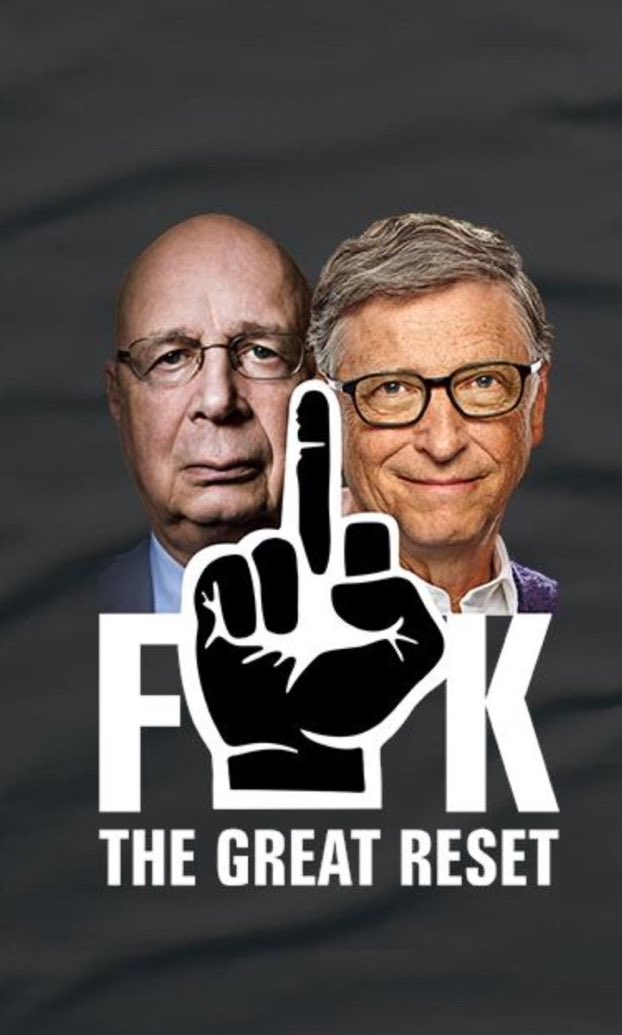
WEF thinks UBI is the Agenda, when your government provides your income they will have total control. Don’t fall for it.
Approximately 1 billion people losing jobs to AI within 10yrs. You are the collateral damage of the 4th industrial revolution.
Approximately 1 billion people losing jobs to AI within 10yrs. You are the collateral damage of the 4th industrial revolution.
The 4th industrial revolution
- replace animal meats with bugs
- replace cars with public transport
- replace planes with nothing
- reduce agricultural & animal farms
- chip & ID everyone + CBDC
Mottos…
- own nothing & be happy
- drive nowhere & be happy
- eat bugs & be happy
- replace animal meats with bugs
- replace cars with public transport
- replace planes with nothing
- reduce agricultural & animal farms
- chip & ID everyone + CBDC
Mottos…
- own nothing & be happy
- drive nowhere & be happy
- eat bugs & be happy

The sinister thoughts of our WEF leaders for the fourth industrial revolution
WEFs “Trusted Digital Identity Bill”
is a life by subscription basis…
Billionaires & corporations have all the power, you just live by their subscription rules, which are subject to change any time they see fit
is a life by subscription basis…
Billionaires & corporations have all the power, you just live by their subscription rules, which are subject to change any time they see fit
EU authorized edible insect foods
- House Crickets
- Yellow Mealworms
- Migratory Locusts
WTF… WEF influenced EU so much
- House Crickets
- Yellow Mealworms
- Migratory Locusts
WTF… WEF influenced EU so much
https://twitter.com/EU_Commission/status/1558014404855209986
Climate Change is a pretense WEF is exploiting to drive y’all info fear of their submission for taking over the free society as we know it 🤷♂️ 

If you think that most governments and global institutions work for the benevolence of its people and humanity, you’ve gotta rethink.
Their green initiatives, their farm restrictions, their #Agenda2030 isn’t for your best interest, but themselves
Their green initiatives, their farm restrictions, their #Agenda2030 isn’t for your best interest, but themselves
Larva fat turned into butter for baking cakes. WEF getting ridiculous 🤮🤮🤮
https://twitter.com/Reuters/status/1233607828239196162
Worlds most hated politicians are members of WEF. World’s most hated billionaires are also part of the WEF.
This isn’t a coincidence, this is by design. They’re being supported financially & they’re being chosen to carry out the WEF #Agenda2030
Resist this madness.
This isn’t a coincidence, this is by design. They’re being supported financially & they’re being chosen to carry out the WEF #Agenda2030
Resist this madness.

Whats the WEF 4th Industrial Revolution, you ask?
It’s all about your compliance. You’re the product. They’re selling you off to billionaire corporations for profits.
You’re tracked, monitored and controlled, all for corporate profit and you’re too busy ignoring it all.
It’s all about your compliance. You’re the product. They’re selling you off to billionaire corporations for profits.
You’re tracked, monitored and controlled, all for corporate profit and you’re too busy ignoring it all.

WEF advisor Yuval Noah Harari says
“We just don’t need the vast majority of the population in todays world”
I’d say we definitely don’t need the WEF, we definitely don’t need Yuval and it’s better for Klaus, Yuval & WEF to shut the fcuk up for all eternity 😤
“We just don’t need the vast majority of the population in todays world”
I’d say we definitely don’t need the WEF, we definitely don’t need Yuval and it’s better for Klaus, Yuval & WEF to shut the fcuk up for all eternity 😤

Great thread on the global food control grab by the WEF elites
https://twitter.com/macrojack21/status/1559923923977904128
With WEF climate emissions policies, digital ID, CBDC, global fertilizer reduction policies, global road & air travel restrictions, global insect food drives…
They’re planning to centralize power into a few corporations and billionaires & accelerate wealth inequality further.
They’re planning to centralize power into a few corporations and billionaires & accelerate wealth inequality further.

WEF’s grand plans for your digital identity…
⁃Control what you can eat
⁃Control what you can spend on
⁃Control where you get medical care
⁃Control who & how you interact with
⁃Control where & how you travel
⁃Control what you can eat
⁃Control what you can spend on
⁃Control where you get medical care
⁃Control who & how you interact with
⁃Control where & how you travel

Don’t trust the WEF
Don’t trust the IMF
Don’t trust the WHO
Think for yourself, if you let them think for you, it’ll be too late to save yourself
Don’t trust the IMF
Don’t trust the WHO
Think for yourself, if you let them think for you, it’ll be too late to save yourself

Daring children to eat crickets in classrooms is a way to brainwash them it’s good for the environment, it’s good for your health etc.
Don’t let WEF & these insect farms to trick your children into eating 🦗
Don’t let WEF & these insect farms to trick your children into eating 🦗
If you want me to tell you the truth, this is how you prevent the next #Plandemic
Decommission the WEF
Decommission the WHO
Decommission the WEF
Decommission the WHO

The 4th Industrial Revolution is going to be the combination of our physical, our digital and our biological identities.
In other words y’all will be chipped sheep taking part in their global experiments.
Say goodbye to freedoms
In other words y’all will be chipped sheep taking part in their global experiments.
Say goodbye to freedoms
WEF Klaus wants your kids implanted with microchips. He wants to control entire generations of humans with #WeirdEccentricForum rules
I’d say it’s the most irrational and irresponsible decision a parent can make for their children ever
Resist #Agenda2030 #GreatReset
I’d say it’s the most irrational and irresponsible decision a parent can make for their children ever
Resist #Agenda2030 #GreatReset

Power grab was the default mantra for how hierarchical societies formed
Kings did power grabs
Warlords did power grabs
Empires did power grabs
Dictators did power grabs
Countries did power grabs
Now WEF, WHO, IMF, big corporations are trying to power grab… don’t let them
Kings did power grabs
Warlords did power grabs
Empires did power grabs
Dictators did power grabs
Countries did power grabs
Now WEF, WHO, IMF, big corporations are trying to power grab… don’t let them

They don’t like the bugs
No problem… burn down food plants
They don’t like fake meats either
No problem… buy their farmlands & starve them to death, they’ll buy
No problem… burn down food plants
They don’t like fake meats either
No problem… buy their farmlands & starve them to death, they’ll buy

• • •
Missing some Tweet in this thread? You can try to
force a refresh


































